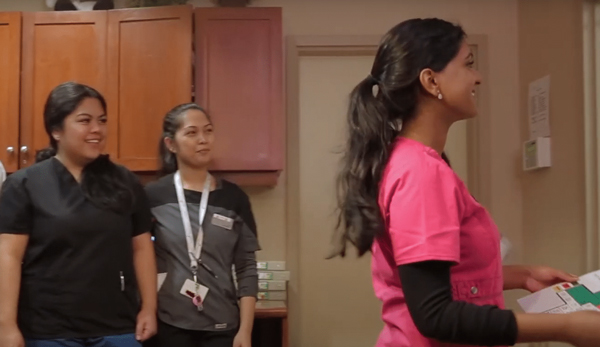
Team-Based Care Pathway Stage 5
Team Evaluation
It is important to continuously reflect on your shared goals and purpose, to ensure you are reaching the goals you set out to achieve as a team. Assessing provider, office staff and patient satisfaction is important to consider in evaluation efforts.
How do you measure your success as a team?
Here’s what to consider in the ‘Evaluation’ phase:
How can our team start to measure our success, and how we can improve?
An important aspect of any project, goal or process is evaluation and measurement. Evaluation and measurement gives us important information on where we are doing well, and where we may need to improve or adjust.
- It may be a good time to revisit the Team Effectiveness Tool, to compare and assess potential areas for improvement.
- This Measurement Plan Worksheet will help identify what measures to collect, when to measure, how to measure, and how to analyze and display the results.
- Measure and display as a team! Remember to involve all team members in the process.
How do we evaluate our team, including patient and provider experience?
Evaluation is a reflection on the work you are doing as a collective. Evaluation can take many forms, from team and patient surveys to staff meeting conversations. Tracking and evaluating collective goals can enhance team cohesion and collective competence.
- See this sample survey on assessing collaborative competencies: Interprofessional Collaborative Competencies Attainment Survey.
- Listen to the TeamUp! Podcast episode TEAM Framework Evaluating Team-Based Care.
- Watch Team Up! Webinar: Reflections from the Field: Community Health Centre Evaluation in BC.
- Review the National Interprofessional Competency Framework as well as the BC Health Quality Matrix to support your measurement goals.
How do we involve patients and families in our evaluation processes?
Involving patients and families is essential to evaluating team-based care. Considerations of patient-centred principles and cultural safety and humility are important for teams to continuously reflect on. Safety = quality.
- Check out Sharing Concerns: Principles to Guide the Development of an Indigenous Patient Feedback Process.
- Discover the Patient Voices Network: Principles for Authentic Patient Engagement.
- See the Patient Voices Network website for more great ideas and resources.
For additional supports for your TBC journey see:
- Doctors of BC: Practice Improvement Program Team-Based Care Coaches – psp@doctorsofbc.ca
- Rural Coordination Centre of BC (RCCbc) Quality Coaching Program
- Your local Health Authority may have Team-Based Care supports available
- If you are part of a Primary Care Network there may be Change Management supports available. See your local Division of Family Practice for more information
- UBC Innovation Support Unit – Department of Family Practice
- Team-Based Care BC maintains an expert list of leaders and content experts across the province and can help you find the support you need
As always, if you know of a great resource or tool that should be added to this pathway or the teambasedcarebc.ca website, please contact us at info@teambasedcarebc.ca.
Even for well-established teams, it can be useful to revisit things like vision and purpose, and consider elements like team complement and efficient space design. Communication is an essential element to effective, high-quality team-based care, so finding time to work on this is key! Investing in time to huddle, connect and communicate will pay off in the long run for your patients, and your practice. Finally, the most important aspect of team-based care is the patient. Remember to place the patient at the centre of the team, and ensure that cultural safety and humility are guiding your practice. We wish you all the best in your TBC journey!